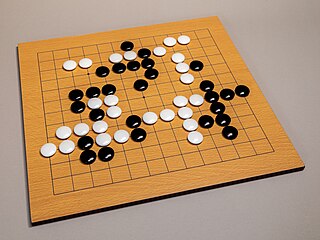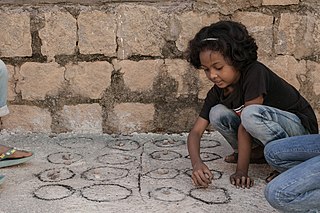External links
- Alex de Voogt at the American Museum of Natural History
- Publications by Alex de Voogt
Alexander Johan de Voogt or simply Alex de Voogt (Baarn, 3 May 1970) is a Dutch researcher and Professor at Drew University, who worked as a curator of African Ethnology at the American Museum of Natural History and best known for his work on the history and distribution of traditional mancala games. He is also editor of Board Game Studies , the main scientific journal on the history of board games.
De Voogt began studying mancala in the 1990s, while he was in Zanzibar studying Swahili. At the time, he began analyzing the rules and strategies of the Bao mancala game (one of the most complex mancala games) by interviewing acknowledged Zanzibari "Bao masters". In 1995 he published his PhD thesis Limits of the Mind: Towards a Characterization of Bao Mastership where he analyzed the intellectual abilities required to master the Bao game.
The work on Bao set the basis for all subsequent research activities by De Voogt. Among the many mancala games De Voogt has been collecting information on and studying there are Katro (Madagascar), Owela (Namibia), Warri (Barbados), Hawalis (Oman), Ohvalhu (Maldives), Mangaley (Syria) and Olinda Keliya (Sri Lanka).

Board games are tabletop games that typically use pieces. These pieces are moved or placed on a pre-marked game board and often include elements of table, card, role-playing, and miniatures games as well.

Mancala is a family of two-player turn-based strategy board games played with small stones, beans, or seeds and rows of holes or pits in the earth, a board or other playing surface. The objective is usually to capture all or some set of the opponent's pieces.

A strategy game or strategic game is a game in which the players' uncoerced, and often autonomous, decision-making skills have a high significance in determining the outcome. Almost all strategy games require internal decision tree-style thinking, and typically very high situational awareness.
A solved game is a game whose outcome can be correctly predicted from any position, assuming that both players play perfectly. This concept is usually applied to abstract strategy games, and especially to games with full information and no element of chance; solving such a game may use combinatorial game theory and/or computer assistance.
The Computer Olympiad is a multi-games event in which computer programs compete against each other. For many games, the Computer Olympiads are an opportunity to claim the "world's best computer player" title. First contested in 1989, the majority of the games are board games but other games such as bridge take place as well. In 2010, several puzzles were included in the competition.

An abstract strategy game is a type of strategy game that has minimal or no narrative theme, an outcome determined only by player choice, and in which each player has perfect information about the game. For example, Go is a pure abstract strategy game since it fulfills all three criteria; chess and related games are nearly so but feature a recognizable theme of ancient warfare; and Stratego is borderline since it is deterministic, loosely based on 19th-century Napoleonic warfare, and features concealed information.

Kalah is a modern variation in the ancient Mancala family of games. The Kalah board was first patented and sold in the United States by William Julius Champion, Jr. in the 1950s. This game is sometimes also called "Kalahari", possibly by false etymology from the Kalahari Desert in Namibia.

Omweso is the traditional mancala game of the Ugandan people. The game was supposedly introduced by the Bachwezi people of the ancient Bunyoro-kitara empire of Uganda. Nowadays the game is dominated by Ugandan villagers. It is a very hard and fast game said to keep one's mind high and ever excited, which can make it addictive. The equipment needed for the game is essentially the same as that of the Bao game. Omweso is strictly related to a wide family of mancalas found in eastern and southern Africa; these include Coro in the Lango region of Uganda, Aweet in Sudan, ǁHus in Namibia, Kombe in Lamu (Kenya), Mongale in Mombasa (Kenya), Mongola in Congo, Igisoro in Rwanda, and Kiela in Angola.

Bao is a traditional mancala board game played in most of East Africa including Kenya, Rwanda, Tanzania, Comoros, Malawi, as well as some areas of DR Congo and Burundi. It is most popular among the Swahili people of Tanzania and Kenya; the name itself "Bao" is the Swahili word for "board" or "board game". In Tanzania, and especially Zanzibar, a "bao master" is held in high respect. In Malawi, a close variant of the game is known as Bawo, which is the Yao equivalent of the Swahili name.

Southeast Asian mancalas are a subtype of mancala games predominantly found in Southeast Asia. They are known as congkak in Malaysia; congklak, congkak, congka, and dakon in Indonesia and Brunei; and sungkâ in the Philippines. They differ from other mancala games in that the player's store is included in the placing of the seeds. Like other mancalas, they vary widely in terms of the rules and number of holes used.

Owela, also referred to by the Khoekhoe language loanword ǁHus, is the Oshiwambo name of a traditional mancala board game played by the Nama people, Herero people, Rukwangali speakers, and other ethnic groups from Namibia. It is related to the Omweso family of mancala games played in Eastern and Southern Africa. Although this is an abstract strategy game, the consequences of individual moves are so hard to predict that it can be considered, to some extent, a game of chance.
Race game is a large category of board games, in which the object is to be the first to move all one's pieces to the end of a track. This is both the earliest type of board game known, with implements and representations dating back to at least the 3rd millennium BC in Egypt, Iraq, and Iran; and also the most widely dispersed: "all cultures that have games at all have race games". Race games often use dice to decide game options and how far to move pieces.
Hawalis is a traditional mancala game played in Oman as well as Zanzibar, where it is known as Bao la Kiarabu, with slightly different rules. It is closely related to African mancalas such as Bao, Njomba, Lela, Mulabalaba (Zambia), Muvalavala (Angola) and Tschuba.
En Gehé is a traditional mancala game played by the Loitha and Kisonga Maasai groups of northern Tanzania. The game was first described in 1904 by a German soldier, Moritz Merker, who was serving in the Kaiserlichen Schutztruppe in German East Africa. Merker later became the first ethnologist to study the Maasai culture.

Katro is a traditional mancala game played by the Betsileo people in the Fianarantsoa Province of Madagascar. The game was first described by Alex de Voogt in 1998.

Fernand Gobet is a cognitive scientist and a cognitive psychologist, currently Professorial Research Fellow at the London School of Economics and Professor of Cognitive Psychology at the University of Roehampton. His research interests focus on the study of cognition, especially in the areas of cognitive architectures, perception, intuition, problem solving, learning and decision making. He has developed the CHREST cognitive architecture, an acronym for Chunk Hierarchy and REtrieval STructures, which is a complete architecture for the processes of learning and perception used by humans.

Game design is the process of creating and shaping the mechanics, systems, rules, and gameplay of a game. Game design processes apply to board games, card games, dice games, casino games, role-playing games, sports, war games, or simulation games.

Tsoro is an ancient two-player mathematical strategy board game that has been played for over a thousand years. It has its roots in Zimbabwe and was first described in literature by J. B. Matthews in 1964. Tsoro belongs to the same class of African strategy board games collectively called Mancala, such as Oware, Bao, and Kalah.
The International Board Game Studies Association (IBGSA) is an academic professional association "devoted to the history and development of board games throughout the world". The IBGSA sponsors an annual scholarly conference, the BGSA Colloquium, as well as an academic peer-reviewed journal, Board Game Studies. The IBGSA's membership includes academics, museum curators, game designers, archivists, and collectors.